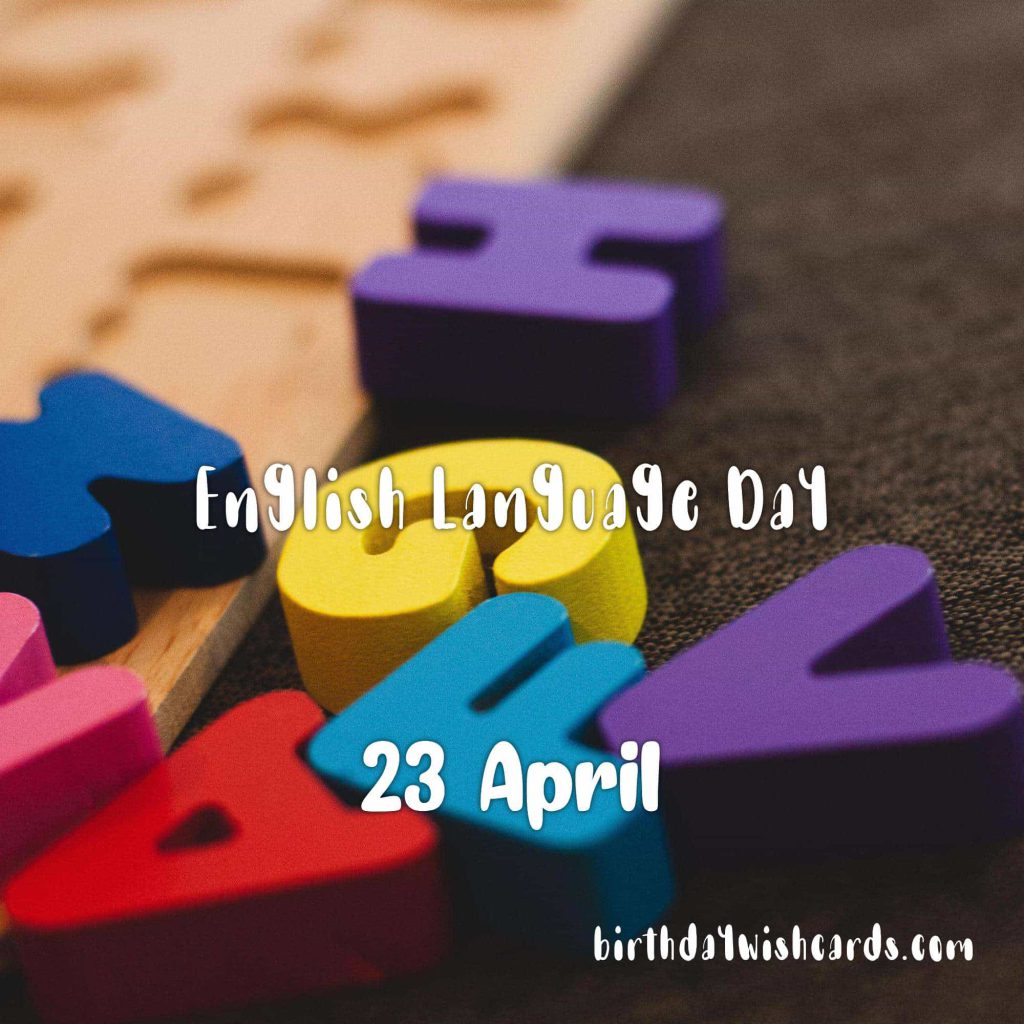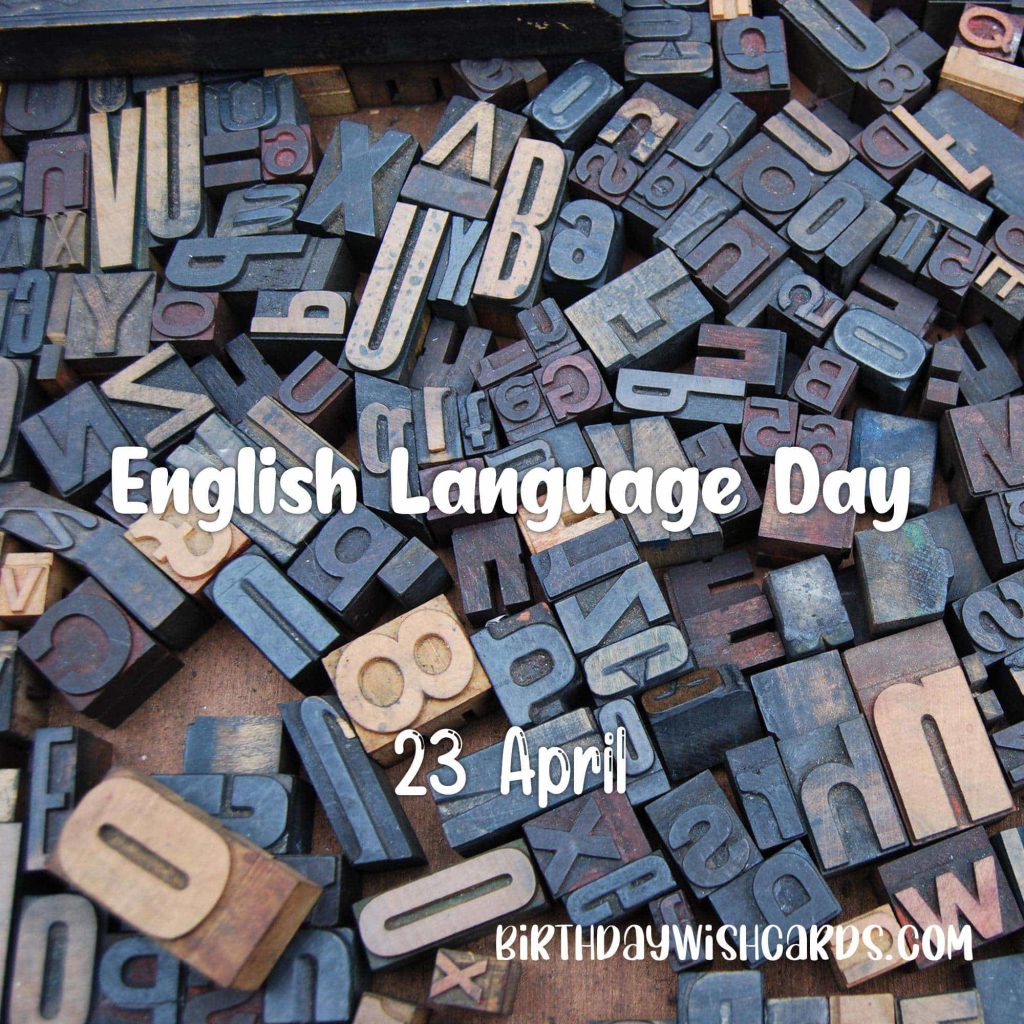
23 April: English Language Day
English Language Day is observed annually on April 23 by the United Nations to celebrate the English language and promote its history, culture, and achievements. English is one of the six official languages of the United Nations, alongside French, Spanish, Chinese, Arabic, and Russian—languages that are also among the most widely spoken worldwide. Notably, April 23 marks both the birth and death anniversary of William Shakespeare, the Bard of Avon. UN English Language Day not only highlights the global significance of English but also commemorates Shakespeare’s enduring legacy.
History of UN English Language Day
The story of the English language begins in the 5th century A.D., when three Germanic tribes—the Angles, Saxons, and Jutes—invaded Britain. Originating from present-day Denmark and northern Germany, these tribes crossed the North Sea and displaced the native Celtic-speaking Britons, who retreated to areas now known as Scotland, Ireland, and Wales. The Angles came from a region called Engla-land (“land of the Angles”) and spoke Englisc, from which the words “England” and “English” are derived.
The languages spoken by these tribes gradually merged into Old English, a form of the language so distinct from modern English that it is largely unintelligible to contemporary speakers. Nevertheless, Old English laid the foundation for today’s language, and many everyday words—such as “be,” “strong,” and “water”—originate from this period.
In 1066, William the Conqueror, Duke of Normandy, invaded England. Norman French became the language of the royal court and administration, while English remained the tongue of the common people. Over time, English absorbed a wealth of Latin and French vocabulary, enriching its lexicon and complexity.
By the 14th and 15th centuries, English regained its status as the language of the royal court and commerce as French political rule ended. This era saw a flourishing of English literature and culture, with William Shakespeare emerging as a pivotal figure. Shakespeare alone contributed over 1,700 new words to English, including “compromise,” “deafening,” “cold-blooded,” “blushing,” “cater,” and “barefaced.”
From the 1600s onward, English evolved rapidly, influenced by global trade, the invention of the printing press, and classical learning. The colonization of North America further extended the reach and influence of English. Today, the language continues to adapt, drawing from diverse cultures and creating new terms in fields such as business, technology, and the arts.




Significance of English Language Day
English Language Day serves several important purposes. It raises awareness of the historical development and cultural richness of English, and recognizes its role as a global lingua franca—facilitating communication, business, education, and diplomacy around the world.
By marking this day, the United Nations encourages the sharing of literature, traditions, and innovations expressed through English. The celebration also promotes multilingualism and cultural diversity, emphasizing how language shapes identity and fosters community.
William Shakespeare: The Bard of Avon
William Shakespeare, born on April 23, 1564, and believed to have died on the same date in 1616, is one of history’s most influential writers. His contributions to English are immense: through his plays, sonnets, and poems, he introduced countless words and phrases still used today. Shakespeare’s inventive use of language expanded English’s expressive power and nuance.
His works explore universal themes—love, power, jealousy, betrayal, and the human condition—making them timeless and resonant across cultures. English Language Day pays tribute to Shakespeare’s legacy and the profound impact he had on the evolution of the language.
English Language Today
Today, English is one of the most widely spoken and studied languages in the world. It serves as the official language of many countries and international organizations, and is essential in fields such as science, technology, business, aviation, diplomacy, and entertainment.
The language continues to evolve, shaped by technological advances, cultural exchange, and the creativity of its speakers. New words and expressions regularly enter the English lexicon, reflecting ongoing changes in society and innovation.
For those interested in learning more, resources such as the Encyclopedia Britannica offer extensive historical and linguistic insights. The United Nations official site also provides information on the significance and celebration of English Language Day.
How to Celebrate English Language Day
- Read classic and contemporary English literature: Explore works by Shakespeare, Jane Austen, Charles Dickens, or modern authors to appreciate the depth and diversity of English writing.
- Expand your vocabulary: Learn new words, idioms, and expressions to enhance your language skills.
- Join language workshops or events: Many communities and educational institutions host activities on April 23 to celebrate English Language Day.
- Share English culture and history: Use social media or community platforms to share facts, quotes, or stories about the English language and its heritage.
- Promote multilingualism: While celebrating English, also recognize the value of other languages and encourage learning multiple languages to foster global understanding.
Conclusion
English Language Day on April 23 celebrates one of the world’s most influential languages, honoring its rich history, cultural importance, and ongoing global impact. From its early beginnings with Germanic tribes to its current status as a global lingua franca, English has undergone extraordinary transformation. The day also pays homage to William Shakespeare, whose literary genius profoundly enriched the language.
Whether you are a student, educator, linguist, or simply a language enthusiast, English Language Day is an opportunity to appreciate the power of English in connecting people and ideas across the globe.




